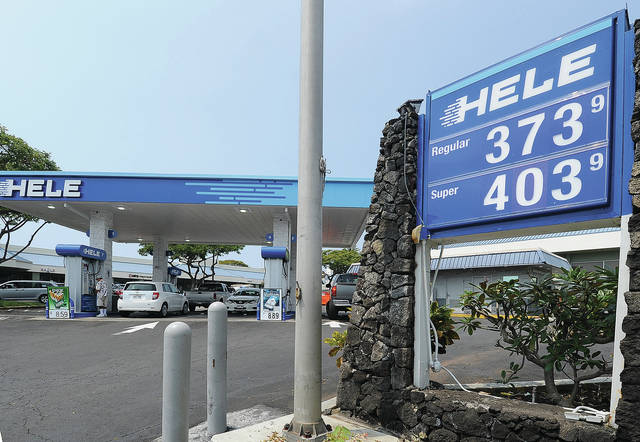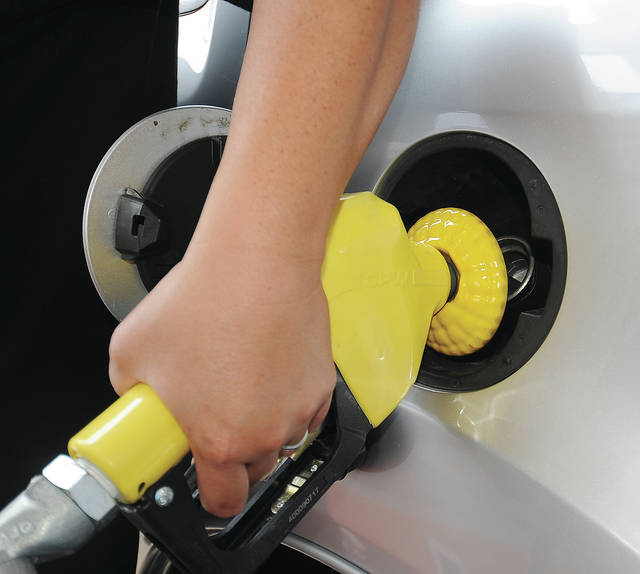KAILUA-KONA — In Hawaii, a frequent home to the highest fuel costs in the country, it always pays to avoid the pump.
The state retained the dubious moniker Friday of most costly to motorists, as the average price of gasoline per 1 gallon of regular unleaded across the islands registered at $3.508, according to the AAA website gasprices.aaa.com. Hawaii’s statewide median edged out No. 2 California by 1.4 cents per gallon.
The numbers represent an increase over March 30 of last year, when the average price of regular unleaded in Hawaii came to $3.058 per gallon, a hike of 45 cents. The trend is consistent across the country, as national averages per gallon have jumped 34.1 cents over the last 365 days, from $2.313 to $2.654.
Hawaii’s highest state average for regular unleaded was recorded at $4.618 on April 11, 2012. The highest national average was $4.114 and came on July 17, 2008.
Jeffrey Spring, corporate communications manager for AAA in the company’s Southern California offices, said the two primary factors driving up fuel prices throughout the U.S. are a moderate hike in the cost of oil and that producers in most parts of the country are switching from a winter-grade gasoline to a summer grade, which is pricier to produce.
A slight drawdown in fuel inventory has pushed gas prices higher in the more recent past, Spring explained. However, that’s been a trend to which Hawaii has proven relatively immune due to more plentiful stores in the American West. The state’s drivers have still seen a disproportionate increase compared with most of the U.S. over the long run, despite the same contributing factors to rising costs.
“Gas prices in Hawaii have been somewhat tempered relative to the rest of the country … and haven’t been changing all that much over the last few weeks,” Spring said. “But things tend to get amplified in markets where there’s not a lot of input.”
In other words, due to steep import fees, when prices rise nationwide they tend to rise a bit more in Hawaii, even when supply is more sufficient here than other states.
Loyden Tabeada, who on Friday afternoon was filling up at Queen K 76 on Queen Kaahumanu Highway, where regular gas was pumping at $3.73 per gallon, wasn’t bitter about the extra strain on his pocketbook. A long-time resident of Hawaii, he said it’s a fact of life to which you simply acclimate.
“You got to just take into consideration the travel time, with traffic too,” Tabbaba explained.
Still, he and his family normally brave the longer wait times at Costco down the highway, where regular unleaded was going for $3.09 per gallon Friday.
Dixson, on the corner of Hualalai Road and Kuakini Highway, was selling for $3.77 per gallon, as was the Shell station on Lako Street. The Aloha Gas station on Henry street marked its regular unleaded at $3.75.
Prices in Hilo were cheaper than in Kailua-Kona but higher than the state average Friday, the median price registering at $3.544. Gas was most expensive on Maui, averaging $3.907 in both Kahului and Wailuku, while it was cheapest on Oahu, coming in at $3.359 in Honolulu. The median cost in Lihue, Kauai was $3.626.
Spring said more competition between Oahu’s higher number of gas stations likely drives prices downward on Hawaii’s most populous island, while higher overhead, such as more expensive leases, or the price retailers are paying for gas could be contributing to Maui’s inflated fuel costs.
He added that barring a refinery issue, he expects gas prices to remain stable in the immediate future. West Texas Intermediate and Brent Crude Oil, two benchmark crudes noted in national gasoline pricing, have been holding relatively steady between $60-$67 per barrel. WTI was around $64 Friday, Spring said, while Brent was around $67.
Adele Henkel, who was also at Queen K 76 Friday afternoon making one of her rare trips to the pump, said it isn’t the figures Hawaii residents ought to worry about, but the fuel itself.
“Our problem isn’t gas prices,” she contended. “It’s that we’re still using gasoline and combustible engines. And the industry is either unable or unwilling to transition us out of this system.”
Henkel said she uses only about a half gallon per week, but wouldn’t be able to do that if she wasn’t retired and able to live a quieter life than most of her neighbors.


